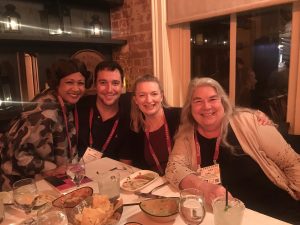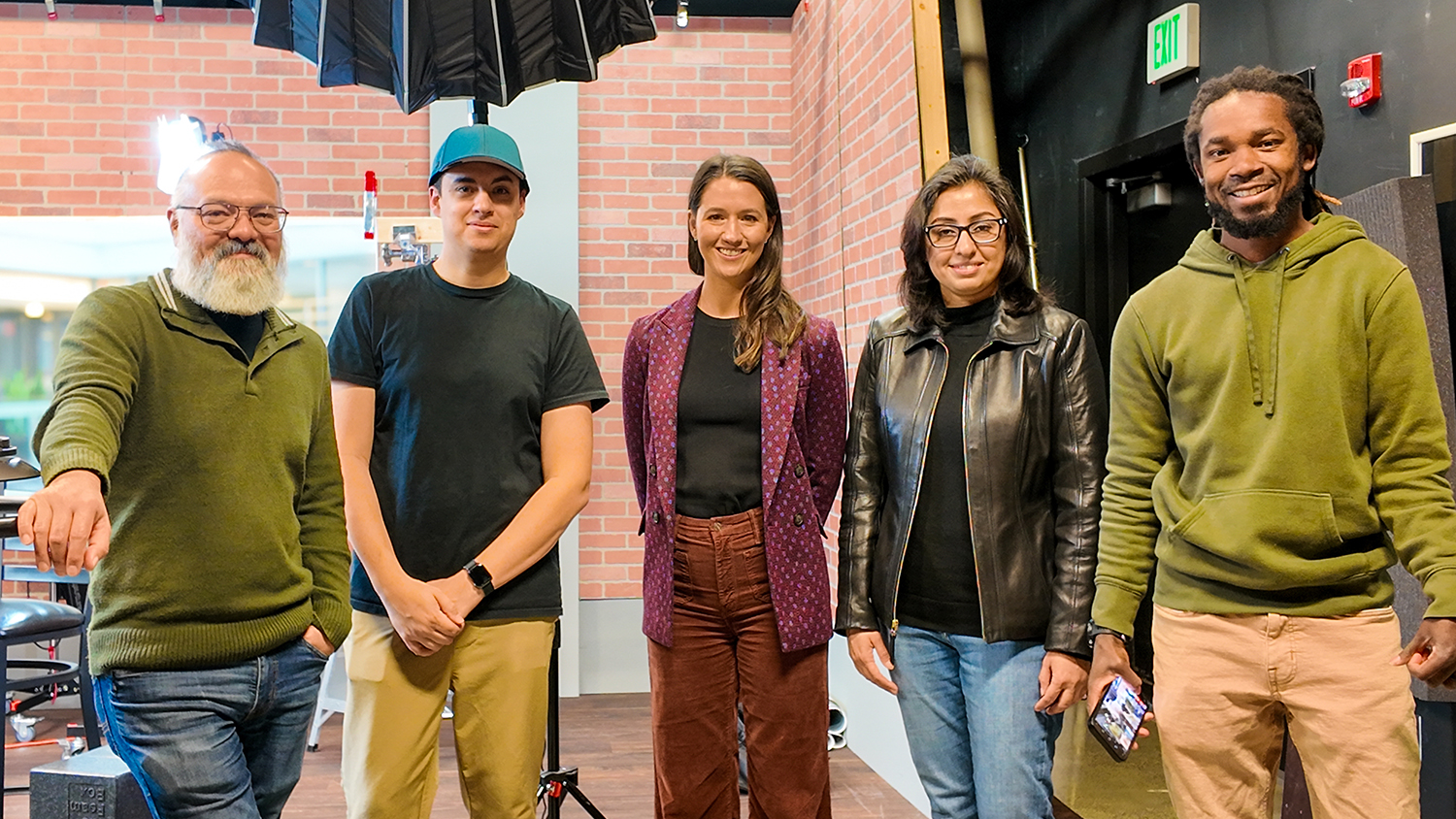EDUCAUSE Annual Conference 2018 Highlights
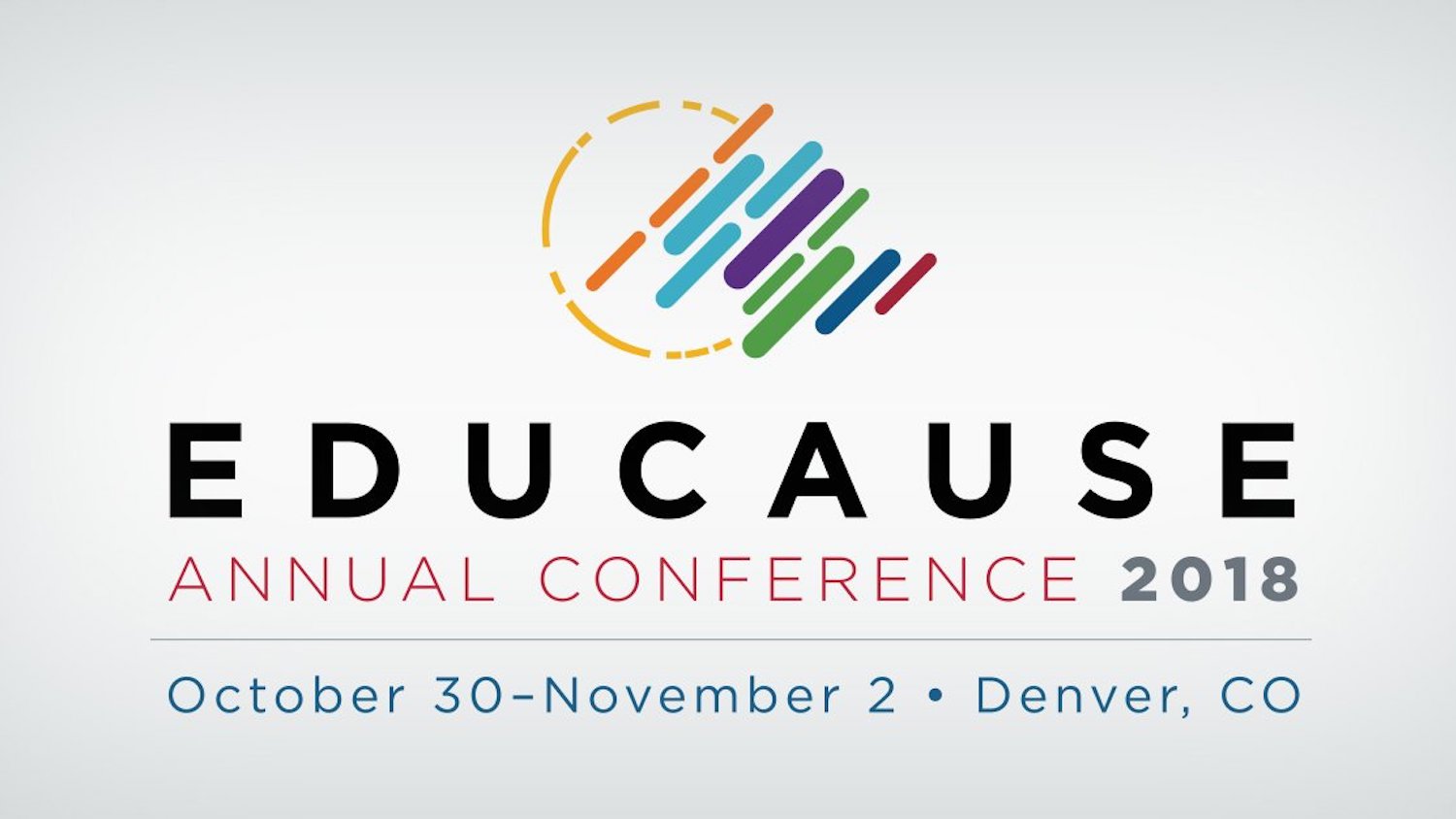
The EDUCAUSE 2018 recap article was written collaboratively and compiled from notes from DELTA attendees.
This year’s EDUCAUSE Annual Conference was held Oct. 30 – Nov. 2, 2018, in Denver, Colorado.
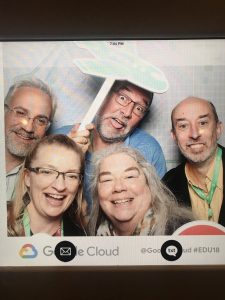 NC State University was well represented at the conference with 11 DELTA staff members in attendance including Donna Petherbridge, Lou Harrison, David Howard, Martin Dulberg, Arlene Mendoza-Moran, Christopher Beeson, Peter Watson, Jeff Webster, Steve Bader, Cathi Phillips Dunnagan and Jeff Robinson. Colleagues from the Office of Information Technology and various colleges were also in attendance.
NC State University was well represented at the conference with 11 DELTA staff members in attendance including Donna Petherbridge, Lou Harrison, David Howard, Martin Dulberg, Arlene Mendoza-Moran, Christopher Beeson, Peter Watson, Jeff Webster, Steve Bader, Cathi Phillips Dunnagan and Jeff Robinson. Colleagues from the Office of Information Technology and various colleges were also in attendance.
“The innovative smorgasbord of thought and technology is what made EDUCAUSE such a petri dish of higher education growth and expansion,” said Mobile Media Producer Jeff Robinson. Robinson wrote a detailed debriefing of his EDUCAUSE experience including a few key sessions and his thoughts on how to implement what he learned at the conference in his day-to-day work at DELTA. Read his debriefing here.
EDUCAUSE opened with pre-conference workshops Tuesday, Oct. 30. Cathi Dunnagan participated in Creating Immersive Storytelling Learning Experiences in 360° Video with Maya Georgieva, Director, Digital Learning/XReality Center at The New School, and Emory Craig, Director, eLearning at the College of New Rochelle.
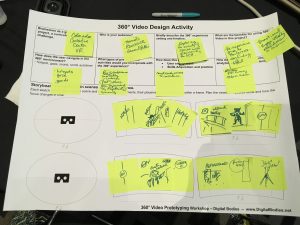
“During the morning, we learned about VR, AR, and MX Reality — the history, the language, the gear, the production. Then, we broke into small groups and talked through possible 360° video VR productions, documenting our discussions on templates developed by the presenters. The first group presented their concept of recording our VR table discussions, moving from table to table. With synergy, our group followed with an interactive tour of the Colorado Conference Center with a focus on Educause. The afternoon was spent applying everything we had learned to creating our projects—shooting, interviewing, and editing our 360° videos,” said Dunnagan.
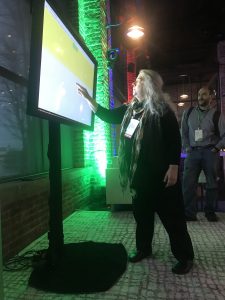
Tuesday night featured a Google Event with speaker Larry Burns who talked to participants about the future of self-driving cars. “More importantly, his talk was about not being afraid to try something new and to be willing to take risks in order to innovate. At the event, there were also some SMART Board® that had a quick draw application; and Cathi was having a really good time with that!” said Petherbridge.
DELTA staff attended additional evening sessions with current partners including a dinner with Top Hat on Wednesday, Oct. 31. The speaker at this dinner, Stacy Morrone from Indiana University, discussed how they were redesigning classrooms at her IU to make them active learning classrooms, and also noted how using the Top Hat tool was an integral part of some of their active learning classroom redesigns. IU has some videos of their faculty talking about instructional tools. They have a great video about how useful Top Hat has been in the classroom.

Wednesday was the official opening day for the conference, with Michele Norris from NPR discussing The Race Card Project. The Race Card Project encourages people to share their feelings about race, in six words. Lou Harrison said it was an inspiring, candid talk about race relations from a very different angle. Her talk was peppered with examples of actual race cards people had filled out. Contributors ran the spectrum from underrepresented minorities to some people you might not expect to participate. Her talk was particularly interesting given the times we live in.
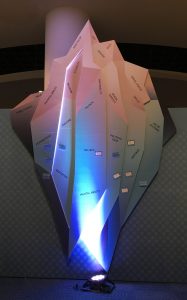
Michele Norris invited everyone to participate in The Race Card Project by writing six words on a postcard or a sticky-note and sharing on the sculpture located in the conference center. Contributions began with a few and continued to grow, filling this sculpture by the end of the conference.
DELTA Presentation
Lou Harrison presented at the Student Success Analytics CG face-to-face meeting on Wednesday at 1:30 p.m. He and a few of the other members of the steering committee met with about 35 interested attendees to talk about what the group does and what it could be for them. They also had an informal continuation of the conversation at a pub on Thursday evening.
Poster Sessions
As always, the conference had a number of interesting Poster Sessions. A few of special interest noted by the team included:
- Redefining Classroom Experiences with Active Learning Room Technology. Ed Pierson and Jack Wiltshire discussed the new Engineering Building at Texas A&M University, and how they used the redesign of the building as an opportunity to redo all of the classrooms as either 50 or 100 seat active learning classrooms. Some of the technologies used in these rooms may be of interest in our DE classrooms. [Donna]
- Men Supporting Men, Supporting Women in IT: Building Empowerment. Steven Burrell talked about his research on mentoring and supporting others, especially women, and about being conscious of gender bias. [Donna]
- Beyond the Discussion Forum: Engaging Students with Collaborative Annotation. Nate Angell spoke about Hypothesis, an open-source tool for digitally annotating online texts. He highlighted its function as a collaboration tool for students to research and discuss online resources. It could be a great option for instructors looking to incorporate more student-to-student interaction in their online courses. [Arlene Mendoza-Moran]
Peter Watson had a particular interest in the poster sessions this year, even more than the scheduled sessions. He added that the poster sessions reminded him of standing meetings at the Kanban board because the poster’s got right to the point. The following are a few of Watson’s thoughts on significant poster sessions:
- Multiple sessions on predictive analytics. Many entities are pursuing this; many in pilot and information gathering stage. It will take a while to sort out what really works and what doesn’t; which interventions succeed and which fail. The same pitfalls exist with educational analytics that exists with educational technology in general: Application of the data (or the technology) is where things really happen
- Scaling Predictive Analytics for Student Success – University of Maryland, Baltimore County. This presentation put forth the idea that the only predictive analytic needed to identify potential underperforming students was their use (or lack thereof) of LMS tools in the first 2 – 3 weeks of the semester. The project used Caliper Analytics and the school was assisted by vendor ACT, Inc. Peter felt that the study definitely identified students likely to blow off the class, but wouldn’t as readily identify students who were using the LMS tools but struggling to succeed.
- Blowing Up Lecture Capture: Combining Blended, Adaptive, and Active Learning – University of Central Florida – great title, great presentation about adopting the “Flipped Classroom” model. The premise of the study was just capturing full lectures was not an effective teaching method, so shorter video modules were created & class time was devoted to problem-solving. A classic flipped model with which we are all familiar. The premise of the project (and frankly the success of any “flipped” course) begs a larger question: Is standing in front of a room of students and talking the best way to teach, period?
- Bringing VR into Higher Ed Communication – Texas A&M – VR demo, with a VR vendor. Like many other entities, Texas A&M’s VR effort focused first on a virtual campus tour. Nicely done, but a focus on student recruiting (and possibly parent impressing) rather than academics.
- Just Like Mom Said: Make Better Decisions – Indiana University Bloomington – Very interesting use of Business Analytics, focused on a more efficient business enterprise, rather than student success.
- IT Reorganization 1.5 years later – University of Idaho IT before and after major re-org, lessons learned. Interesting, and guess what, communication with stakeholders is #1 priority, where they got things right, and some examples of what they did wrong.
Conference Sessions
The conference featured numerous interesting sessions. Some of the recurring themes in the sessions, as well as in hallway conversations, were around workforce development, major changes in the higher educational landscape and learning analytics. A few of the sessions DELTA staff members attended of note include:
- Microcredential and Professional Learning and Microcredentials and Badges Community Group Session. Both of these sessions provided an opportunity to discuss an emerging trend in the higher educational space; that is, how to award/note smaller units of credit. In the next year, EDUCAUSE will be redoing their badging system, rethinking the constellation (or framework) of their system. We also received some information that Credly has purchased by Acclaim, There was a lot of discussion of the different platforms that can be used for badging, including Open Badges (https://openbadges.org/). Additionally, some of the important conversations were around how badging/credentialing really only work well if extensive planning has been done to storyboard/outline the system that an institution will use, including noting what will be awarded and how, and the importance of having a university-wide governance structure in place for badging/credentialing efforts. At NC State, there is interest in this area, especially in non-credit, internal training/faculty development and executive education. If you are interested in being hooked into the NC State conversations in this subject area, contact Bethany Smith (bvsmith@ncsu.edu).
- Learning Analytics Dashboards for Teaching and Learning. Three leaders from three different universities talked about their different approaches for dashboards in the learning analytics space. The three dashboards discussed were for three different audiences: administrators, teachers and students. It was very interesting to think about the different needs of the different audiences both in terms of what data they were interested in and how they might need to use it. This session provided us useful contacts for future work.
- Paths to Predictive Learning Analytics: Can Data Predict Learner Success? This was another session about learning analytics where folks from Indiana University discussed some studies that they have been doing. I couldn’t tell if the session was discussing results from the Center for Learning Analytics and Student Success, but they did mention that program and some of the work being done there.
- The Future of Higher Education: Our Response to Disruption. This talk was given by Jim Phelps, the winner of this year’s EDUCAUSE Community Award. He talked about a number of drivers and challenges that we are experiencing in higher education, including the need for shifting skills for current university IT staff, the challenges of digital transformation, employment and income challenges from a societal perspective, and the higher educational financial crisis. He also focused on the huge complexities faced by IT staff who are trying to support and manage systems that interweave across many facets; discussing how challenging it is to do that well.
- Open-Source Tools for Auditing and Inspecting Web Accessibility Jon Gunderson presented on the hard work that the University of Illinois was doing to make their web space accessible. This was a hands-on workshop demonstrating the open source tools they built and the ones they use to make sure web content meets W3C Web Content Accessibility Guidelines 2.0 Level A and AA requirements. Historically, making sure web applications were accessible was a very difficult job but now with HTML5 and Aria techniques, the job is simpler. With the UoI’s Function Accessibility Evaluator, you can very quickly identify issues and correct them.
Closing
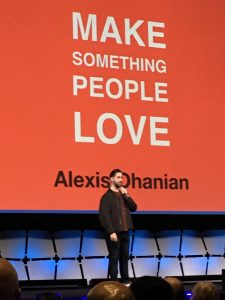
Friday’s closing speaker Alexis Ohanian, founder of Reddit, talked about being entrepreneurial and, as he put it, “making something that people love.” He definitely noted that his own success story began with a “no” and that you have to keep trying! He also emphasized that every single person should learn how to code, because if you can code then you can create something. He was an inspirational way to close the conference.
Donna Petherbridge added, Inside Higher Education posted an article about the conference, “What to Expect When You’re Expecting Tech Transformation,” on November 5, noting the difficulty faced by those in academic technology who are dealing with rapid change, complex problems and systems, and the need to forge multiple partnerships (both internal and external to the institution) in order to make progress. Quoting from the article, “This is hard to do.” Agreed; we are in an ever-evolving and complex landscape where multiple individuals are being affected by the change. To move positively forward, we must be as collaborate, transparent and forward-thinking as possible. We must be willing to take risks and to carefully assess what works and what does not.
The DELTA attendees agreed this was another great EDUCAUSE Annual Conference and are already looking forward to next year’s conference Oct. 14-17 in Chicago.

